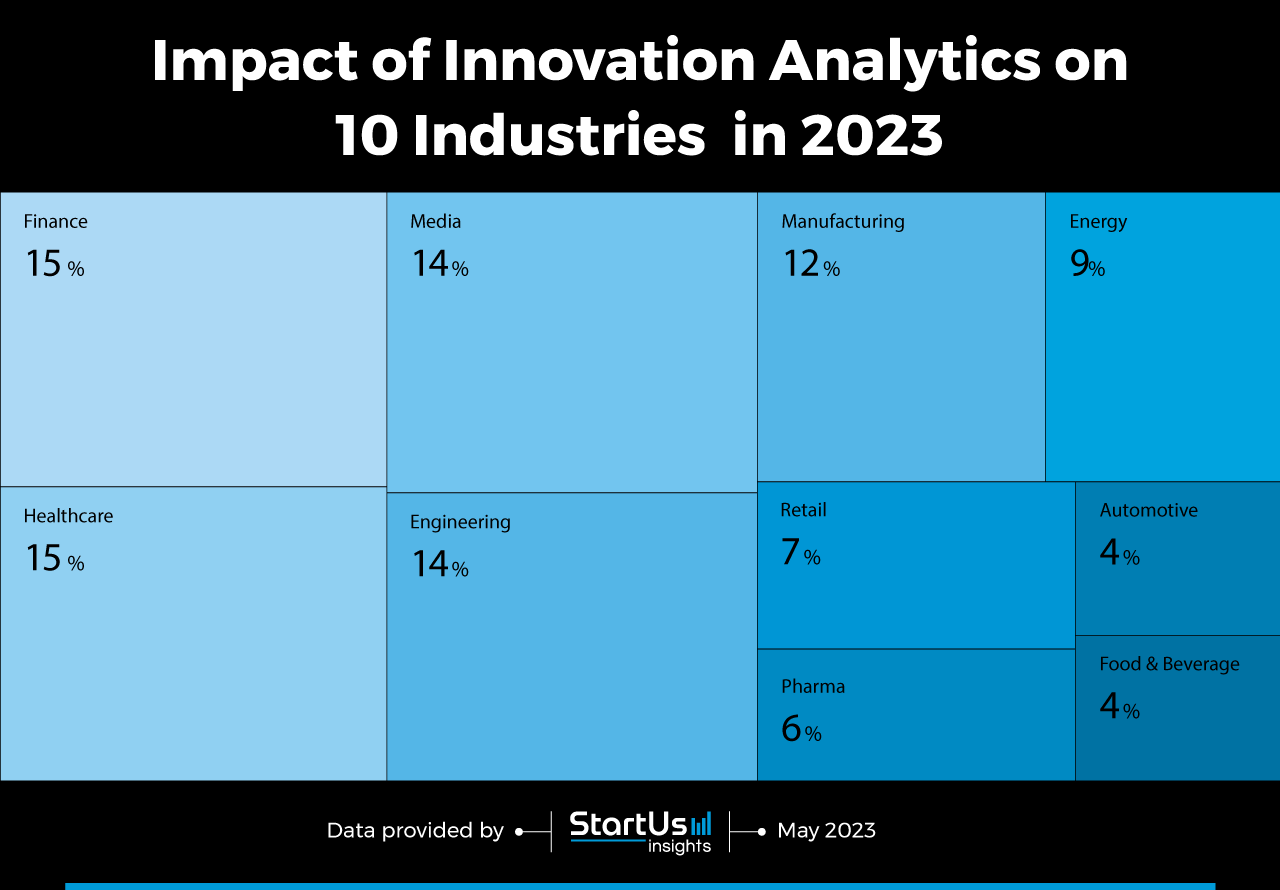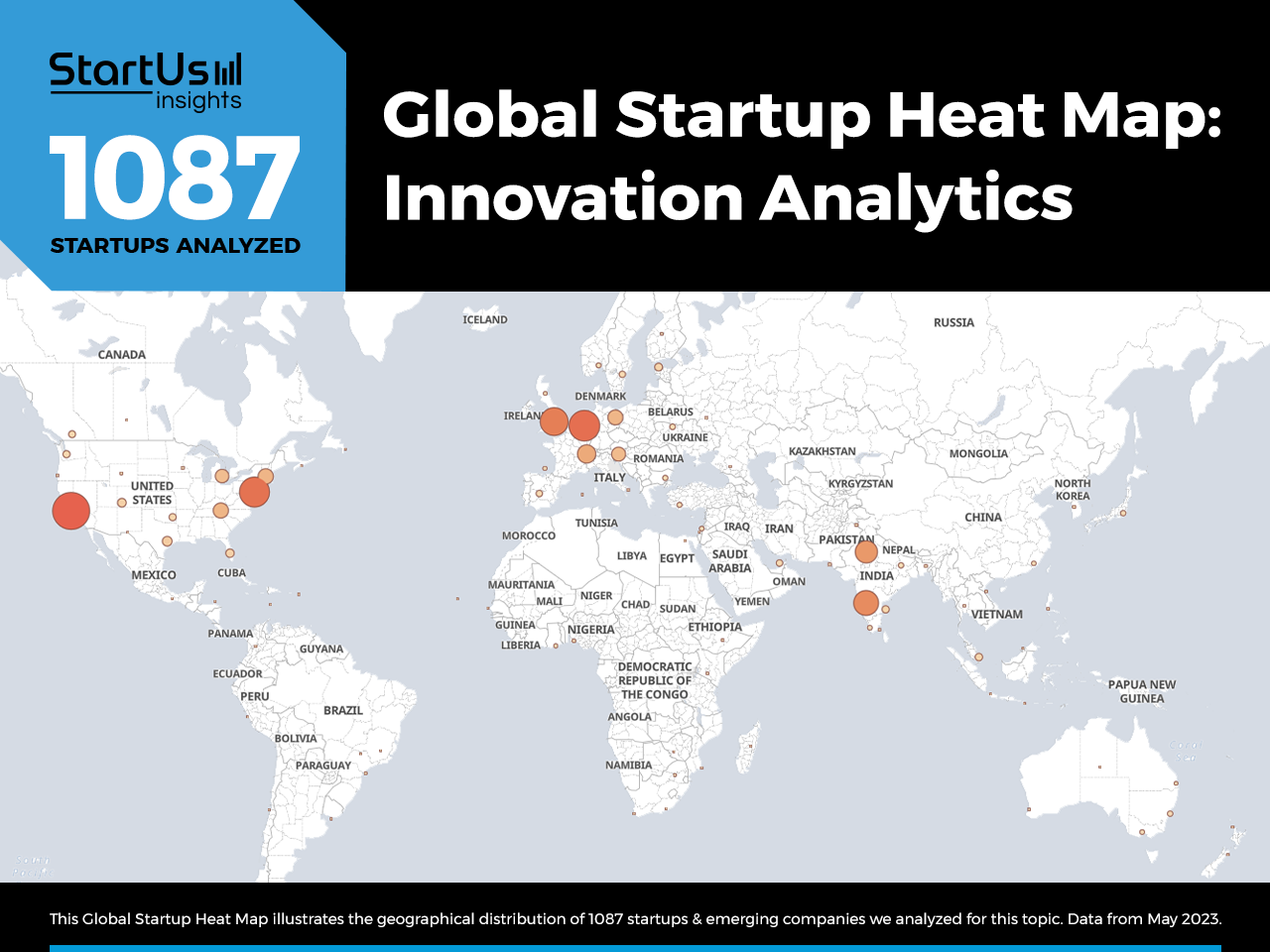Today’s fast-paced business world requires companies to stay competitive and drive growth. To achieve this, organizations leverage technologies, like ChatGPT, that optimize operations and improve the bottom line. This article focuses on the impact of innovation analytics on various industries and how they advance business growth. These solutions analyze data on market trends, customer preferences, and product performance. With these insights, companies create more efficient supply chains, personalize market efforts, reduce waste, and boost profits.
To make innovation management easy, we offer a range of products and services. This includes our brand new Trend Intelligence platform that features over 20 000 trends as well as the Startup Scouting platform. They utilize AI to analyze topics and 3 790 000+ startups & scaleups globally. As the world’s largest resource for data on emerging companies, the SaaS platform enables you to identify relevant technologies and industry trends quickly & exhaustively.
Tree Map reveals the Emerging Innovation Analytics Use Cases across Industries
Based on the Innovation Map, the Tree Map below illustrates the major Use Cases of Innovation Analytics across 10 industries in 2023. Innovation analytics transforms various industries. This includes finance, healthcare, media, engineering, manufacturing, energy, retail, pharma, automotive, food, and military.
Across these industries, innovation analytics drives business growth and enhances operational efficiency. Its use cases also include identifying new market opportunities, optimizing supply chain management, and increasing product quality. With the help of innovation analytics, companies create data-driven strategies that enable them to stay ahead of the competition and achieve long-term success.
Global Startup Heat Map covers 1087 Innovation Analytics Startups & Scaleups
The Global Startup Heat Map below highlights the global distribution of the 1087 exemplary startups & scaleups that we analyzed for this research. Created through the StartUs Insights Discovery Platform that covers 3 790 000+ startups & scaleups globally, the Heat Map reveals that the US has a high concentration of innovation analytics startups, followed by Europe and India.
Below, you get to meet 10 out of these 1087 promising startups & scaleups as well as the solutions they develop. These 10 startups are hand-picked based on criteria such as founding year, location, funding raised, & more. Depending on your specific needs, your top picks might look entirely different.
Interested to explore all 1000+ innovation analytics startups & scaleups?
Impact of Innovation Analytics on 10 Industries
1. Finance
The finance sector deals with various dynamic and external factors that drive customer trends. Implementing innovation analytics allows finance businesses to keep track of changing customer expectations and update their products or services to meet specific demands. This enables a more personalized and positive customer experience.
Moreover, analyzing data related to credit, market, and operational risk enables them to identify potential risks and improve fraud detection. Banks and non-banking financial companies (NBFCs) integrate AI or machine learning-powered dashboards in internal organizational workflows. With big data analytics, they analyze and monitor their data in real time, enabling better decisions and accurate trend forecasts.
NayaOne offers Synthetic Finance Data
NayaOne is a UK-based startup that creates synthetic data for applications in the finance industry. It allows businesses to train machine learning models, test software, and conduct research or analysis. Moreover, synthetic data is less expensive than real-world data (RWD), anonymizes customer information, enables rapid prototyping, and creates more diverse and representative datasets.
This enables high-performance data processing models and accurate predictions. For the finance sector, NayaOne’s synthetic data provides individual-level data, such as the number of family members and education, to accurately forecast defaulters.
2. Healthcare
Unlike other industries, the healthcare space lacks a well-defined process to develop new products, has a complex regulatory landscape, and has high development costs. Hence, it is critical for healthcare businesses to integrate innovation analytics. Through this, researchers are able to streamline operations while healthcare institutions benefit from increased customer satisfaction.
For instance, analyzing the entire history of patients provides specific insights into their behavior, preferences, and risk profiles. This data allows physicians to deliver personalized care for patients and MedTech companies to develop personalized products. Further, healthcare digitization provides businesses with massive amounts of otherwise unavailable information that improves population health management and operational efficiency.
Rekonnect delivers Post-Market Analytics
Rekonnect is a Swedish startup that provides post-market analytics. The startup’s solution allows medical technology companies to connect directly with individuals who use devices. This provides them with customer intelligence and delivers real-time support for device users for critical case handling.
As a result, the startup’s solution centralizes product data, simplifies digital asset management, and streamlines device management. Moreover, it secures post-market data collection and reduces medical device failures while lowering customer churn.
3. Media
The growing interest and developments in digital and social media provide businesses with high-value customer intelligence. Innovation analytics leverage this data to offer insights into audience behavior, content consumption patterns, and advertising effectiveness.
As a result, media organizations are able to optimize content distribution channels, reduce operational costs, and improve return on investment (ROI). This data-driven approach also enables media companies to forecast customer trends and personalize product offerings, increasing viewership and conversion.
Rivalytix provides Competitor Intelligence
Rivalytix is an Australian startup that offers competitor intelligence scores for the healthcare sector. The startup’s solution allows its clients to monitor rival businesses in detail. Through Rivalytix’s competitor intelligence scores, users compare products and business attributes.
Additionally, the startup’s market saturation index provides businesses with visibility into total competitor activity across channels, markets, or business areas. Further, its active monitoring solution allows it to identify the drivers behind every change. This allows businesses to capitalize on competitors’ strengths and limit exposure from their weaknesses.
4. Engineering
Product designing, prototyping, and testing are the major sectors greatly benefiting from innovation analytics. With data processing technologies like generative AI and machine learning, engineering firms analyze historical data related to sales, customer preferences, and product performance. This allows product designers to simulate various design parameters and promptly identify issues before prototyping.
Competitor analysis also provides businesses with critical insights into how other companies sharing the same market landscape are attracting customers with their products. Through these efforts, innovation analytics reduces product development lifecycle while increasing product performance.
Acumen Labs improves Software Product Quality
Acumen Labs is an Israeli startup that provides engineering metrics to improve product quality. The startup’s solution uses data analytics and machine learning to capture, measure, and analyze key engineering metrics.
This provides software development firms with real-time insights that enable continuous improvement and increase productivity. This, in turn, allows them to improve pull request cycle time and mean time to resolve (MTTR) while analyzing defect density to increase team performance.
5. Manufacturing
The application of innovation analytics in manufacturing operations includes product development and many other segments like logistics and maintenance. For instance, manufacturing companies analyze technology trends to adopt innovative solutions that increase production throughput, sales, or customer engagement.
Such solutions allow manufacturers to streamline floor operations and improve quality control. Further, they leverage predictive analytics-powered intelligence solutions to predict equipment failure, reduce downtime, and enhance asset performance.
Cast Analytics enables Continuous Process Improvement
Cast Analytics is a Canadian startup that allows manufacturers to ensure continuous process improvement. The startup’s solution utilizes computational modeling to create digital twins and find optimum process parameters.
Additionally, it validates the solution against RWD to increase modeling accuracy. With the solution, businesses are able to remove trial and error-based workflows in finding optimum cooling and cycle times for their manufacturing processes.

6. Energy
The energy sector primarily benefits from innovation analytics in optimizing grid infrastructure and reducing resource wastage. For example, grid operators are able to promptly identify newer technologies that reduce renewable intermittency with innovation analytics. This allows utilities to be early adopters of innovative technologies and increase sales or save costs.
Apart from this, innovation analytics solutions greatly impact the development and integration of renewable energy into the grid, improving grid reliability. Energy companies also need to forecast energy production and price, which novel analytics solutions offer, for making business decisions. Customer intelligence allows utility companies to better understand customer preferences and tailor services to further improve engagement.
Bitbloom aids SCADA Data Exploration
Bitbloom is a UK-based startup that develops a range of proprietary software for wind farm owners and operators. The startup’s SCADA data exploration platform, Sift, features an open environment, supports various renewable asset performance analysis workflows, and includes anomaly detection algorithms.
Its other platform, Sift Monitor, then monitors the analyses implemented on Sift to offer energy loss calculations and failure prognostics. Moreover, detects sub-optimal performance, estimates long-term yields, improves production balancing, and more. This allows wind farm owners and operators to optimize assets and achieve revenue goals.
7. Retail
Innovation analytics enables retailers to deliver personalized product and service offerings for customers. For this, such solutions analyze customer data to better customer preferences and their purchasing behavior. Retail businesses leverage innovation analytics to drive product development based on customer demographics, market trends, and sales.
They also monitor inventory data to reduce the risk of stockouts and lost sales while predictive analytics allows them to forecast demands and reduce overstocking. Additionally, retailers optimize supply chain management with innovation analytics by tracking inventory levels, market demands, shipping times, and delivery routes. This allows brands to increase sales and customer engagement.
Assert AI offers Customer Intelligence
Assert AI is an Indian startup that provides customer intelligence for retail brands. The startup’s solution leverages computer vision and AI to analyze customer movement, behavior, and patterns inside stores.
Additionally, it helps in preventing theft and shoplifting. These features simplify inventory management while improving store safety and performance. The solution also offers heatmaps to improve the stock layout, product visibility, and staff training.
8. Pharma
The pharmaceutical sector utilizes innovation analytics to advance research and development, clinical trials, and drug safety. It allows pharma organizations to quickly identify emerging technologies, like large language models (LLM), that will disrupt the industry. For example, quantum computers, a class of high-performance systems, accelerate drug development workflows.
Additionally, analytics solutions allow pharma companies to identify drug candidates faster, optimize clinical trial design, and improve patient safety. Access to patient data enables them to further minimize drug reactions, identify population health risks, and enable personalized medicine.
Clintex delivers Clinical Trial Intelligence
Clintex is an Estonian startup that offers clinical trial intelligence. The startup’s solution combines predictive analytics, machine learning, and blockchain to offer immutable data analysis to pharma companies. Its distributed ledger and smart contracts also enable auditable workflow management for ongoing trials.
This collaborative ecosystem allows all stakeholders to identify and resolve potential issues before they impact the trials. Moreover, clinical project managers, physicians, and pharmacovigilance staff are able to leverage risk-based monitoring while increasing patient retention and recruitment.
9. Automotive
The automotive industry is a design-intensive sector and automobile engineering is a critical part of the manufacturing process. Innovation analytics solutions deliver insights into customer behavior, market trends, and post-sales product performance. This provides automakers with highly relevant data that drives vehicle and component designing.
Further, predictive analytics enable automotive businesses to create products and services that cater to changing customer preferences and market demands. It allows businesses to optimize supply chains, improve manufacturing efficiency, and reduce costs. As a result, they are able to stay ahead of the competition and create sustainable mobility solutions.
DAXEOS simplifies Automotive Product Lifecycle Management
DAXEOS is a US-based startup that aids automotive product development lifecycle management. The startup’s cloud-based software, DAXEOS Digital Engineering Data Hub, collects data from various Internet of Things (IoT) sources across locations.
It then analyzes and reports on key metrics and trends in real time to make accurate business decisions. The software also enforces role-based access control to ensure secure access. Consequently, the startup promotes collaboration between engineers while allowing manufacturers to increase productivity.
10. Food & Beverage
Similar to the retail sector, the food and beverages industries utilize innovation analytics to primarily improve product and service offerings as well as enable hyper-personalization. Insights into consumer behavior and market trends allow food companies to promptly identify business opportunities and drive continuous product and process improvement.
Further, they are able to find the best time to integrate disruptive technologies, like chef robots and 3D food printers, into workflows while ensuring market exposure. This allows food and beverage businesses, including restaurant chains, to stay relevant in the market and offer products tailored to customers.
Starday Foods provides Product-Market Fit Prediction
Starday Foods is a US-based startup that offers a software platform to predict product-market fit. It utilizes machine learning models to track shifts in consumer behavior to detect pent-up demand and create products that meet consumer needs.
Based on such analyses, the startup offers a range of food products including an all-natural chocolate hazelnut spread, gut-friendly rice blend, and plant-based protein.
Discover All Innovation Analytics Startups
Advances in big data and analytical tools allow companies to gain deeper insights into operations and customer behavior. Additionally, such solutions find applications in areas such as predictive maintenance, risk management, and quality control. This further enhances operational efficiency and drives business growth. As businesses become increasingly data-driven, innovation analytics will play a critical role in helping them stay ahead of the curve. Get in touch to identify specific startups & solutions that advance your business!





![Generative AI in eCommerce: Top 10 Applications [2025 & Beyond]](https://www.startus-insights.com/wp-content/uploads/2024/11/Generative-AI-in-eCommerce-SharedImg-StartUs-Insights-noresize-420x236.webp)





